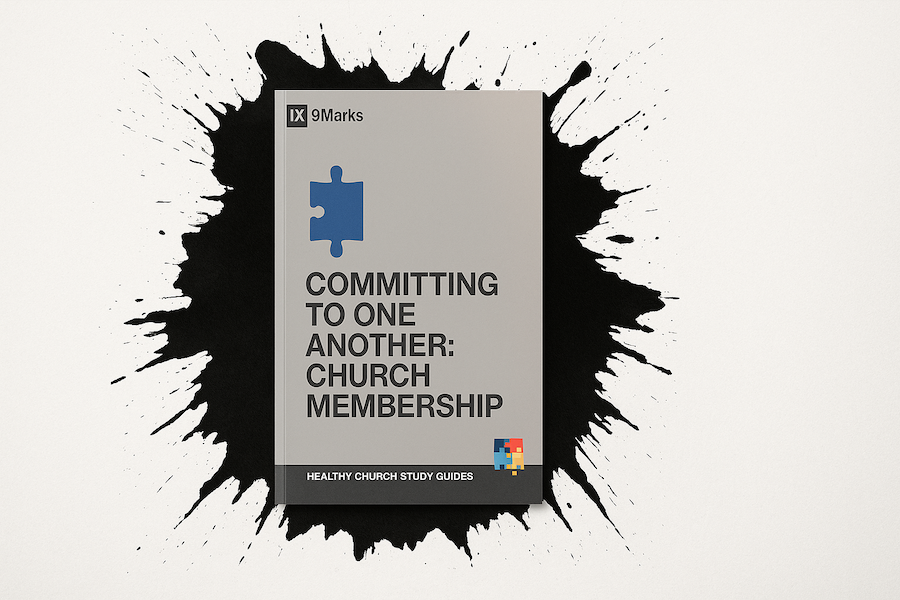
This is a review of Committing to One Another: Church Membership by Bobby Jamieson, with editorial contributions from Mark Dever and Jonathan Leeman, which is part of the Healthy Church Study Guides series from 9Marks and Crossway Publishing (Wheaton, IL). Released in 2012, this small group study guide is designed for use in congregational settings and includes discussion questions and teaching notes for leaders. The resource notes, “These study guides are mainly driven by observation, interpretation, and application questions, so get ready to speak up! (Page 8)”
A simple guide that might just spark deeper community
The Healthy Church Study Guides series covers the nine distinctives of a healthy church as originally laid out in Nine Marks of a Healthy Church by Mark Dever. It outlines a structured, nine-session exploration (seven main sessions plus introduction and theological foundation) of church membership, aimed at cultivating a more intentional understanding of commitment to the local church. The resource is short—just 64 pages—but packed with theological reflection and practical application, formatted to encourage group dialogue.
This book is best described as a short, discussion-oriented guide with both discipleship and theological underpinnings. It invites participants to consider church membership through observation, interpretation, and application. This is a resource that is meant to be wrestled with. The study argues that while the term membership is not something that explicitly appears in the Scriptures, the New Testament reflects a clear sense of communal identity, accountability, and participation within local church communities. I might say that the thesis is that membership involves a mutual covenant between a Christian and a local church, grounded in shared affirmation, submission, and discipleship, meant to clearly define who is in and out. As the book states, “though in one sense church membership begins when Christ saves us and makes us a member of his body… his work must then be given expression in an actual local church” (Page 12). The style is accessible and intentionally dialogical, shaped for community processing in a group, structured around an introduction and seven weekly sessions.
Is church membership outdated—or more important than ever?
The opening chapter from Mark Dever presents a biblical overview of membership. This apparently was originally published as Chapter 10 of What is a Healthy Church?, by Mark Dever. Week 1 addresses the need for membership, Week 2 the biblical mandate, and Week 3 the goal. Week 4 turns to the challenges of membership, while Week 5 explores its nature. Week 6 covers the duties of membership—one of the strongest chapters—and the final week reflects on the glory of membership, a topic that could have benefited from further theological richness. The book concludes with around 20 pages of teaching notes, reinforcing the guide’s practical focus.
The authors are all key leaders in the 9Marks movement. Dever, who shaped this series the most, serves as senior pastor of Capitol Hill Baptist Church in Washington, D.C. Leeman, a significant voice in the 9Marks ministry, provides the formal definition of membership in the guide. Crossway, the publisher, is well known for its strong resourcing for Reformed evangelical theology and its promotion of the English Standard Version (ESV) of the Bible.
A down-to-earth look at what it really means to commit to your church.
I read this book as part of a broader effort to reevaluate and raise the bar on membership at River Corner Church, where I serve as pastor. In preparation for a sermon series on church commitment, I am reviewing multiple resources from different theological streams. While this book reflects a more conservative and Reformed orientation than my Anabaptist and Vineyard background, I found much that resonated with my own paradigm and experience. The resource provides an important challenge that the local church in many traditions, including my own, would benefit from engaging more deeply. It does a good job of raising the bar.
What I found helpful—and what gave me pause—in this guide on church life.
The authors name the problem well, “Sadly, it is not uncommon to find a big gap between the number of people officially on the membership rolls and the number who regularly attend” (Page 13). This is a common reality that is evidenced in a recent study that found “the typical Southern Baptist church has 233 members with only 70 attending on Sunday morning” (Page 13). The church needs a healthier understanding of membership and the commitment it means: because “We don’t love old friends well by allowing them to hold onto their membership in our congregations for sentimental reasons” (Page 14). Membership has a great purpose, to mature the church, and so they argue that “The goal of church membership is that every single church member would help the whole church grow to maturity in Christ” (Page 27). I agree with that.
Critically, the book achieves its goal of presenting a compelling case for intentional membership, though with some caveats. Its strengths lie in its concise presentation, theological conviction, and structured format. However, it occasionally slips into an elitist tone—common to me in some 9Marks materials—and leans on proof texts without always fully supporting its claims. For example, the suggestion that “the New Testament apparently kept lists of people” relies on texts like 1 Timothy 5 and Acts 6, which are not definitive evidence of formal membership rolls, in my opinion (Page 11). Furthermore, statements like “we can no longer express our confidence that you’re going to heaven” come across as overly harsh, overtly superior, and risk conflating spiritual assurance with institutional belonging (Page 14). While I affirm the call for greater and more meaningful accountability and community, the absence of a fuller vision for mutual submission between members and leaders leaves the model vulnerable to authoritarian interpretation. A broader engagement with other voices might have offered a helpful balance in understanding what this looks like practically for each person. It brings discussion, but lacks practical steps.
Final Thoughts
In conclusion, Committing to One Another: Church Membership is a timely and challenging resource for churches seeking to take membership more seriously. Despite theological differences, it raises important questions about commitment, discipleship, and community life that transcend denominational lines. This book is best used in a discussion setting where its claims can be thoughtfully engaged, affirmed, challenged, and contextualized. For churches navigating apathy around commitment, it serves as a healthy starting point for deeper conversations about what it means to truly belong to one another in Christ.













